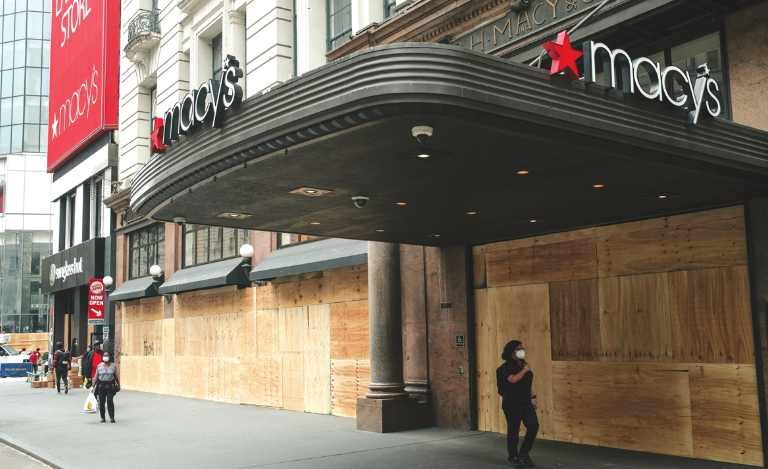Questioning Retailers' Sincerity
US
service industry giants condemn racism but critics say profiling persists

As racial justice protests have swept the US, leading retailers have taken
to social media to proclaim their commitment to equality.
But such statements decrying racism in the wake of the George Floyd's murder
have been met with incredulity by some nonwhite customers, who recount instances
of being quizzed by sales staff on how they make their money or watched
"through the shelves" by security, as one shopper put it on Instagram.
Racial profiling, which inspired the hashtag #shoppingwhileblack, has
proven a nettlesome problem that the industry has largely avoided directly
engaging in recent days, even as retailers come out publicly to condemn racism
and promise greater diversity in their leadership.
&uuid=(email))
Black and Hispanic shoppers have questioned companies' sincerity, saying
even if they haven't been stopped by security guards, they feel routinely
surveilled and unwelcome in stores in ways that white people do not.
The tension has in the past resulted in retailers making major payouts to settle
profiling lawsuits.
In one of the most well-publicized incidents, Starbucks closed 8,000 stores for
a day to give employees training on how to avoid implicit bias after the April
2018 arrest of two black men at a Philadelphia store.
More to be done
Jerome Williams, a business professor at Rutgers University, recalled an
episode in the 1980s when three of his children failed to meet back up during a
shopping excursion.
After much worry, Williams discovered they were detained by mall security, who
deemed the kids suspicious because they were wearing new shirts.
Besides the encounter itself, Williams was troubled by white work colleagues who
told him the incident was no big deal.
Since then, "there has been tremendous progress, but we have not eliminated
all of the problem," said Williams, who advises retailers on addressing
profiling.
Civil rights advocates hope the nationwide protests following the death of Floyd
at the hands of the Minneapolis police lead to change not just in policing, but
in other realms where the United States has fallen short of its stated ideals.
"Corporate leaders must do a lot more than issue press statements condemning
racism," said Dariely Rodriguez, director of the economic justice project at
the Lawyers' Committee for Civil Rights Under Law.
"They must embrace longstanding calls by advocates to dismantle structural
racism" by addressing wage discrimination, promoting non-white employees to
leadership positions and "eradicating racial discrimination against black
customers and workers," she said.
Profiling behavior
 To
counter shoplifting, which costs the industry billions of dollars each year,
retailers emphasize profiling - but only for behavior, not race, said Read
Hayes, director of the Loss Prevention Research Council, an industry-backed
research group.
To
counter shoplifting, which costs the industry billions of dollars each year,
retailers emphasize profiling - but only for behavior, not race, said Read
Hayes, director of the Loss Prevention Research Council, an industry-backed
research group.
Employee manuals outline suspicious behavior: customers who walk the perimeter
of the store, avoid eye contact, or canvass for security cameras.
In many cases, companies explicitly say not to profile by race, Hayes said.
He believes racial profiling still happens on an "isolated" basis, adding
that retailers have every incentive to create a welcoming environment for
customers.
"It's so taboo to do any of these things, but there are still individuals who
make mistakes," he said.
In 2014, New York State fined the department store Macy's $650,000 and required
an independent monitor for three years after an investigation showed the chain
had apprehended and falsely accused nonwhite customers at much higher rates than
white customers.
In May 2018, shortly after the Starbucks incident, Nordstrom Rack flew its
president to St. Louis to apologize to three young black men who were wrongly
accused of shoplifting.
&uuid=(email)) The company said employees had not followed procedures and should not have
called the police.
The company said employees had not followed procedures and should not have
called the police.
Both Macy's and Nordstrom have condemned the Floyd killing and promised greater
diversity in leadership and suppliers. Neither company responded to requests for
interviews.
'A societal issue'
Experts who advise retailers say even when there is a will to eliminate bias,
doing so is not straightforward.
Companies sometimes link security guards' performance evaluations to
apprehensions, and some retailers lack robust systems for resolving customers'
complaints of profiling.
Shaun Gabbidon, a professor at Penn State Harrisburg who recently authored a
book on the history of profiling, said retailers have ignored his
recommendations to release data on customer apprehensions, which could show if
there is racial disparity.
"The problem is when you have a high-profile incident, no one has enough data to
say if this is just a blip," he said.
Discussing race can be fraught and should be done in a way that encourages
employees to open up and not fear reprisal, experts say.
"There's no shame in having biases," but it's important to recognize and not act
on them, said Anne-Marie Hakstian, a professor at Salem State University. "Of
course, it's a societal issue. Racism is all around us."
globaltimes.cn